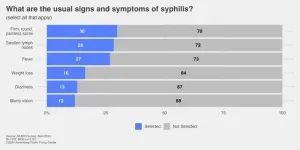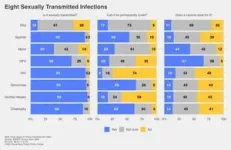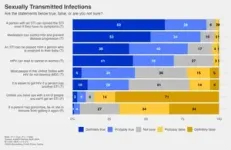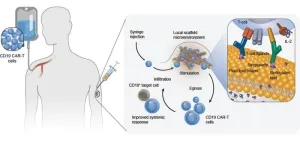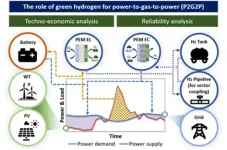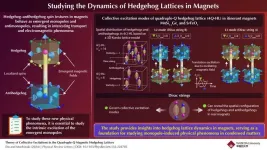(Press-News.org) PHILADELPHIA – Syphilis cases are on the rise around the globe, but many Americans don’t know the symptoms.
In January, the Centers for Disease Control and Prevention (CDC) reported that syphilis cases had risen 80 percent over the five years from 2018 to 2022, totaling more than 200,000 in 2022, the last year for which data are available.
Yet just over half of U.S. adults (54%) know that a case of syphilis can be permanently cured and most either mistakenly think there is a vaccine to prevent it (16%) or are unsure (45%), according to the Annenberg Public Policy Center’s new survey findings on sexually transmitted infections (STIs). The survey of U.S. adults finds that many are familiar with some ways they can protect themselves from syphilis but lack familiarity with its symptoms and signs.
The survey also finds areas of uncertainty about other STIs, including whether they can be cured and whether vaccines exist. Only a third of the public knows that HPV (human papillomavirus) cannot be permanently cured and a third of the public does not know there is a vaccine to prevent it. (The CDC reports that the HPV vaccine has the potential to prevent more than 90% of HPV-attributable cancers.) Two years after a global outbreak of mpox, formerly called monkeypox, most people do not know whether it can be cured (it can be) or whether a vaccine exists (it does).
“With the rising number of syphilis cases, knowing the causes, symptoms, and treatment for it assumes added importance,” said Kathleen Hall Jamieson, director of the Annenberg Public Policy Center (APPC) of the University of Pennsylvania.
APPC’s latest Annenberg Science and Public Health (ASAPH) Knowledge survey, conducted from April 18-24, 2024, questioned a national probability sample of over 1,500 empaneled U.S. adults about their knowledge about sexually transmitted infections, with more extensive questions about knowledge and treatment of syphilis and HIV. See the survey toplines.
Protecting oneself from contracting syphilis
What people do know: When asked to select which, among the following, are ways that individuals can protect themselves from contracting syphilis, most people got the answers right – selecting the correct ways and skipping the wrong answers:
78% correctly chose abstinence, or not engaging in sex
77% correctly chose using a condom
94% correctly did NOT select oral contraception (the pill)
89% correctly did NOT select wearing a diaphragm
78% correctly did NOT choose getting a vaccine (there is none)
But 71% did not select using only clean needles, which is one of the ways to protect oneself from contracting syphilis.
Failing to recognize symptoms of syphilis
What people don’t know: When asked to select usual syphilis signs and symptoms from a list, less than a third of survey respondents selected any of these symptoms (according to the CDC, all are symptoms of types of syphilis):
30% selected “firm, round, painless sores”
28% selected “swollen lymph nodes”
27% selected “fever”
16% selected “weight loss”
13% selected “dizziness or lightheadedness” [the CDC says it’s a sign of otosyphilis]
12% selected “blurry vision” [the CDC says it’s a sign of ocular syphilis]
How can HIV be spread?
The survey finds that U.S. adults are generally knowledgeable about how HIV (human immunodeficiency virus) can be spread. Asked to select from a list which of these methods are ways in which HIV can be spread:
95% know HIV can be spread through unprotected sex
90% know HIV can be spread by sharing needles
67% know HIV can be spread from an infected person to their child while giving birth
Respondents also know that the following means are not ways in which HIV can be spread:
89% correctly did NOT select by exposure to airborne droplets that are coughed or sneezed into the air by an infected person.
88% correctly did NOT select from touching a surface contaminated by the virus
85% correctly did NOT select by using the “party drugs” known as poppers
However, only 1 in 3 adults (33%) knows that HIV can also be spread from an infected parent breastfeeding a child.
How can you get an STI?
The survey finds that U.S. adults are generally familiar with how you can get an STI. Asked to select from which of the following activities you can get an STI:
98% know you can get it from vaginal sex
89% know you can get it from oral sex
93% know you can get it from anal sex
91% know you can get it from genital-to-genital contact
In addition, 44% selected kissing as a way to get an STI (generally not, but it may be a risk factor for oral gonorrhea) and 21% chose sitting on a toilet (which is not a form of transmission).
Can it be cured and is there a vaccine?
Large majorities of the public know that six out of eight infections considered in the survey are sexually transmitted infections, including syphilis, HPV, HIV, gonorrhea, genital herpes, and chlamydia – with the exceptions being mpox (which 39% identified as sexually transmitted) and Zika (which 12% identified as sexually transmitted). Zika is a mosquito-borne infection that also can be sexually transmitted. Although mpox cases have declined since the 2022 outbreak, “low-level [U.S.] transmission continued,” according to public health officials, who in June urged continuing vigilance, especially among men who have sex with men.
The public is not sure whether some of the STI infections can be permanently cured or whether a vaccine exists to prevent them. Over half know that gonorrhea (65%), chlamydia (63%) and syphilis (54%) can be cured, but under a third (29%) know that mpox can be cured. But:
91% are not sure whether Zika can be cured or think it can be (it can’t be cured)
65% are not sure whether HPV can be cured or think it can be (it can’t be cured)
42% are not sure whether genital herpes can be cured or think it can be (it can’t be cured)
26% are not sure whether HIV can be cured or think it can be (it can’t be cured)
Asked whether a vaccine exists to prevent these infections, only for HPV is a majority of the public aware (67%) that there is one, while 44% knows there is a vaccine for mpox. For these other infections there is no vaccine and most of the public is either not sure or incorrect:
Zika: 80% do not know there’s no vaccine (69% not sure, 11% say yes there is)
Syphilis: 61% do not know there’s no vaccine (45% not sure, 16% yes)
HIV: 52% do not know there’s no vaccine (33% not sure, 19% yes)
Gonorrhea: 57% do not know there’s no vaccine (43% not sure, 14% yes)
Genital herpes: 55% do not know there’s no vaccine (40% not sure, 15% yes)
Chlamydia: 59% do not know there’s no vaccine (45% not sure, 14% yes)
Other knowledge about STIs
Much of the public does have a reasonable level of background knowledge about STIs. Large majorities know that someone with an STI can spread the STI to others even if there are no symptoms (91% true); that medication can control HIV and prevent disease progression (87% true); that an STI can be passed from a person who is pregnant to their baby (78% true); and that HPV can lead to cancer in women (69%). And they know it is false to say that unless you have sex with a lot of people you can’t get an STI (85% false) and that it is false to say that if a person had gonorrhea he or she is immune from getting it again (68% false).
The questions with the greatest uncertainty involve HIV. Just 42% know that most people in the United States with HIV do not develop AIDS (36% not sure) and 38% know it is easier to get HIV if a person has another STI (41% not sure).
APPC’s ASAPH survey
The survey data come from the 19th wave of a nationally representative panel of 1,522 U.S. adults, first empaneled in April 2021, conducted for the Annenberg Public Policy Center by SSRS, an independent market research company. This wave of the Annenberg Science and Public Health Knowledge (ASAPH) survey was fielded April 18-24, 2024, and has a margin of sampling error (MOE) of ± 3.5 percentage points at the 95% confidence level. All figures are rounded to the nearest whole number and may not add to 100%. Combined subcategories may not add to totals in the topline and text due to rounding.
Download the toplines and methodology statement.
The policy center has been tracking the American public’s knowledge, beliefs, and behaviors regarding vaccination, Covid-19, flu, maternal health, climate change, and other consequential health issues through this survey panel for over three years. In addition to Jamieson, the APPC team includes Shawn Patterson Jr., who analyzed the data; Patrick E. Jamieson, director of the Annenberg Health and Risk Communication Institute, who developed the questions; and Ken Winneg, managing director of survey research, who supervised the fielding of the survey.
The Annenberg Public Policy Center was established in 1993 to educate the public and policy makers about communication’s role in advancing public understanding of political, science, and health issues at the local, state, and federal levels.
END
Syphilis cases are rising, but many people don’t know symptoms
Public unfamiliar with which STIs can be cured or prevented with vaccination
2024-06-12
ELSE PRESS RELEASES FROM THIS DATE:
Nancy Kanwisher shares 2024 Kavli Prize in Neuroscience
2024-06-12
The Norwegian Academy of Science and Letters today announced the 2024 Kavli Prize Laureates in the fields of astrophysics, nanoscience, and neuroscience. The 2024 Kavli Prize in Neuroscience honors McGovern Investigator and MIT neuroscientist Nancy Kanwisher, UC Berkeley neurobiologist Doris Tsao, and Rockefeller University neuroscientist Winrich Freiwald for their discovery of a highly localized and specialized system for representation of faces in human and non-human primate neocortex. The neuroscience laureates ...
2024 Kavli Prize Laureates named in astrophysics, nanoscience and neuroscience
2024-06-12
Eight scientists from three countries are honored for their research that has broadened our understanding of the big, the small and the complex.
June 12, 2024 (Oslo, Norway) — The Norwegian Academy of Science and Letters today announced the 2024 Kavli Prize Laureates in the fields of astrophysics, nanoscience and neuroscience. Eight scientists from three countries are honored for their research that has broadened our understanding of the big, the small and the complex. The laureates in each field will share $1 million USD.
The ...
Nasal microbiota is potential diagnostic biomarker for sepsis
2024-06-12
Washington, D.C—The nasal microbiota of intensive care unit (ICU) patients effectively distinguishes sepsis from non-septic cases and outperforms analyzing the gut microbiota to predict sepsis, according to a new study published in Microbiology Spectrum, a journal of the American Society for Microbiology.
“These findings have implications for the development of diagnostic strategies and advancements in critical care medicine,” said corresponding study author Xiaolong He, M.D., Ph.D., a professor at the Microbiome Medicine Center, Department of Laboratory Medicine, ...
Boosting CAR-T cell therapies from under the skin
2024-06-12
T-cell stimulating biomaterial that slowly biodegrades under the skin stimulates CAR-T cells in the body to improve therapeutic efficacy in an aggressive mouse tumor model.
By Benjamin Boettner
(BOSTON) — CAR-T cell therapies are transforming the treatment of previously incurable blood cancers. Six approved CAR-T products have been administered to more than 20,000 people, and more than 500 clinical trials are underway. However, according to a recent study out of the Massachusetts General Hospital, ...
Overcoming the volatility of renewable energy, green hydrogen is 'the best'
2024-06-12
A research team in Korea Institute of Energy Research has successfully demonstrated the effectiveness of a green hydrogen system used to supplement the volatility of renewable energy.
*Green hydrogen: Hydrogen obtained by electrolysis of water, in which electrical energy derived from renewable sources such as solar and wind power is applied to water to produce hydrogen and oxygen. This production method is an environmentally friendly hydrogen production process with no carbon dioxide emissions.
Dr. Joungho Park and his research team at the Energy ...
Redefining "hormonal": The new nonprofit empowering women
2024-06-12
Hormonally.org is a digital platform that provides free-to-access, evidence-based resources designed to empower women (and all those affected by hormones) to seek the appropriate care, treatment, and support they deserve. Hormonally’s mission is to make access to information on women’s hormonal health a more equitable experience for all.
The new nonprofit organization offers accessible information and a safe place to discuss and discover everything from the first period to post-menopause. Hormonally ...
MD Anderson and Sibylla Biotech announce strategic collaboration to discover and develop small-molecule protein degraders
2024-06-12
HOUSTON and MILAN ― The University of Texas MD Anderson Cancer Center and Sibylla Biotech today announced a strategic collaboration agreement to discover and develop novel small-molecule cancer therapies known as folding interfering degraders (FIDs), which disrupt the proper folding of target proteins and lead to their degradation.
Under the agreement, Sibylla and MD Anderson will jointly conduct discovery and development work from target identification through drug candidate nomination on selected proteins, with the potential ...
Uncovering the nature of emergent magnetic monopoles
2024-06-12
Magnetic monopoles are elementary particles with isolated magnetic charges in three dimensions. In other words, they behave as isolated north or south poles of a magnet. Magnetic monopoles have attracted continuous research interest since physicist Paul Dirac’s first proposal in 1931. However, real magnetic monopoles have not yet been observed and their existence remains an open question. On the other hand, scientists have discovered quasi-particles that mathematically behave as magnetic monopoles in condensed ...
New study shows long-term effectiveness of gastric bypass in treating type 2 diabetes and obesity
2024-06-12
SAN DIEGO – June 12, 2024 -- Roux-en-Y gastric bypass, a type of weight-loss surgery, kept type 2 diabetes in remission for up to 15 years and most of the weight off for up to 20 years in one of the largest long-term studies of patients undergoing the procedure. The study* was presented today at the American Society for Metabolic and Bariatric Surgery (ASMBS) 2024 Annual Scientific Meeting.
Researchers from Geisinger Medical Center in Danville, PA analyzed diabetes remission rates and weight-loss outcomes of 2,045 patients who had a gastric bypass at their center between 2001 and 2008 ...
Hokkaido University scientist recognized in award from the Royal Society of Chemistry
2024-06-12
The NSF Center for Molecularly Optimized Networks team, of which Professor Jian Ping Gong of the Faculty of Advanced Life Science and the Institute for Chemical Reaction Design and Discovery (WPI-ICReDD) at Hokkaido University is a member, has won a Horizon Prize from the Royal Society of Chemistry.
The Royal Society of Chemistry (RSC)’s Prizes portfolio is one of the oldest and most prestigious in the world, recognizing achievements by individuals, teams and organizations in advancing the chemical sciences. They reward those undertaking excellent work in the chemical sciences from across the world. The NSF Center for Molecularly Optimized Networks team, including Professor ...
LAST 30 PRESS RELEASES:
New knowledge on heritability paves the way for better treatment of people with chronic inflammatory bowel disease
Under the Lens: Microbiologists Nicola Holden and Gil Domingue weigh in on the raw milk debate
Science reveals why you can’t resist a snack – even when you’re full
Kidney cancer study finds belzutifan plus pembrolizumab post-surgery helps patients at high risk for relapse stay cancer-free longer
Alkali cation effects in electrochemical carbon dioxide reduction
Test platforms for charging wireless cars now fit on a bench
$3 million NIH grant funds national study of Medicare Advantage’s benefit expansion into social supports
Amplified Sciences achieves CAP accreditation for cutting-edge diagnostic lab
Fred Hutch announces 12 recipients of the annual Harold M. Weintraub Graduate Student Award
Native forest litter helps rebuild soil life in post-mining landscapes
Mountain soils in arid regions may emit more greenhouse gas as climate shifts, new study finds
Pairing biochar with other soil amendments could unlock stronger gains in soil health
Why do we get a skip in our step when we’re happy? Thank dopamine
UC Irvine scientists uncover cellular mechanism behind muscle repair
Platform to map living brain noninvasively takes next big step
Stress-testing the Cascadia Subduction Zone reveals variability that could impact how earthquakes spread
We may be underestimating the true carbon cost of northern wildfires
Blood test predicts which bladder cancer patients may safely skip surgery
Kennesaw State's Vijay Anand honored as National Academy of Inventors Senior Member
Recovery from whaling reveals the role of age in Humpback reproduction
Can the canny tick help prevent disease like MS and cancer?
Newcomer children show lower rates of emergency department use for non‑urgent conditions, study finds
Cognitive and neuropsychiatric function in former American football players
From trash to climate tech: rubber gloves find new life as carbon capturers materials
A step towards needed treatments for hantaviruses in new molecular map
Boys are more motivated, while girls are more compassionate?
Study identifies opposing roles for IL6 and IL6R in long-term mortality
AI accurately spots medical disorder from privacy-conscious hand images
Transient Pauli blocking for broadband ultrafast optical switching
Political polarization can spur CO2 emissions, stymie climate action
[Press-News.org] Syphilis cases are rising, but many people don’t know symptomsPublic unfamiliar with which STIs can be cured or prevented with vaccination
